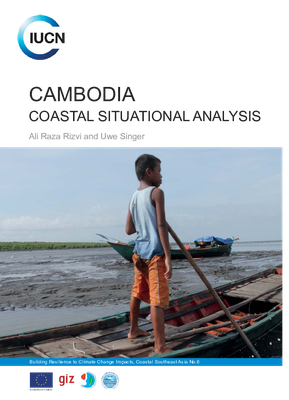CAMBODIA COASTAL SITUATIONAL ANALYSIS
IUCN is implementing a European Union funded Project, “Building Coastal Resilience in Coastal Southeast Asia”, in Cambodia, Thailand, and Vietnam. This initiative aims at field testing adaptation options and strengthening the capacity of institutions and communities to integrate best practice results in the overall national polices and action planning for adaptation and ecosystems’ management. The purpose of the current report is to provide baseline information to the project staff and partners, to facilitate subsequent working steps, such as stakeholder consultations, climate risk and vulnerability assessments, and the prioritisation of adaptation options. The report has been compiled based on accessible secondary data. In depth stakeholders’ consultations and firsthand data collection were not undertaken as part of the report preparation. It is thus a living document which will be updated throughout the project implementation phase.
https://biodiversitylinks.org/projects/completed-projects/cbnrm/cbnrm-literature-review-sources/cambodia-coastal-situational-analysis/view
https://biodiversitylinks.org/projects/completed-projects/cbnrm/cbnrm-literature-review-sources/cambodia-coastal-situational-analysis/@@download/image/image.png
File
CAMBODIA COASTAL SITUATIONAL ANALYSIS
Author(s):
Ali Raza Rizvi and Uwe Singer
Publication Date: 2011
DOWNLOAD FILE
IUCN is implementing a European Union funded Project, “Building Coastal Resilience in Coastal Southeast Asia”, in Cambodia, Thailand, and Vietnam. This initiative aims at field testing adaptation options and strengthening the capacity of institutions and communities to integrate best practice results in the overall national polices and action planning for adaptation and ecosystems’ management. The purpose of the current report is to provide baseline information to the project staff and partners, to facilitate subsequent working steps, such as stakeholder consultations, climate risk and vulnerability assessments, and the prioritisation of adaptation options. The report has been compiled based on accessible secondary data. In depth stakeholders’ consultations and firsthand data collection were not undertaken as part of the report preparation. It is thus a living document which will be updated throughout the project implementation phase.



